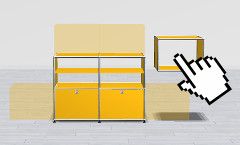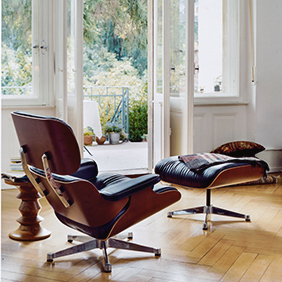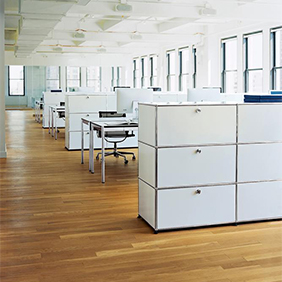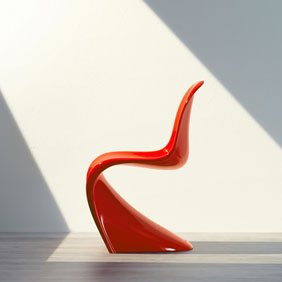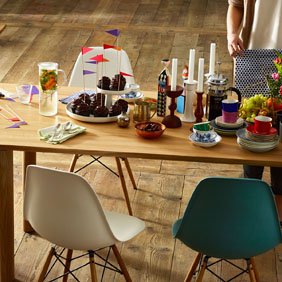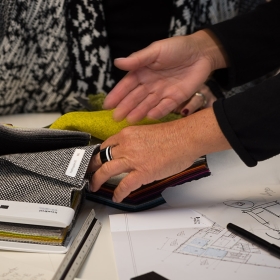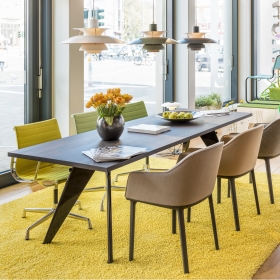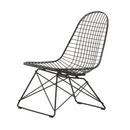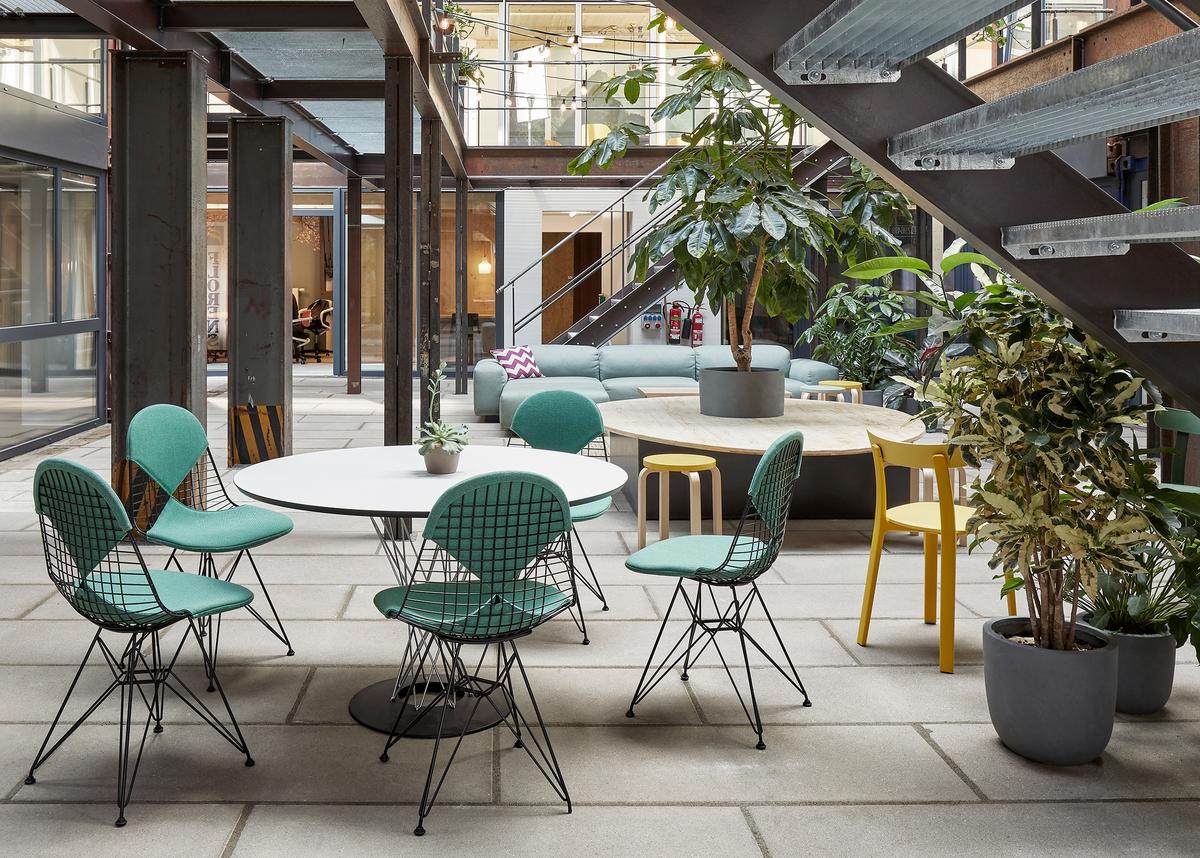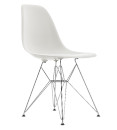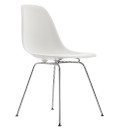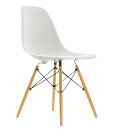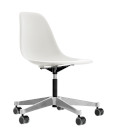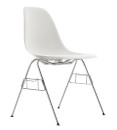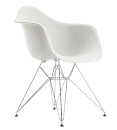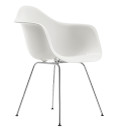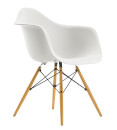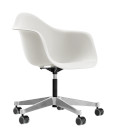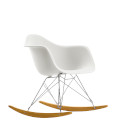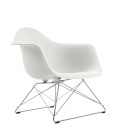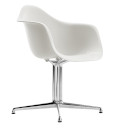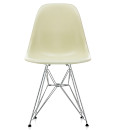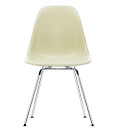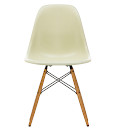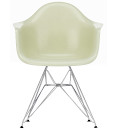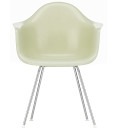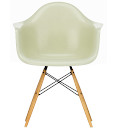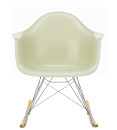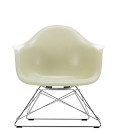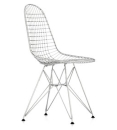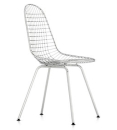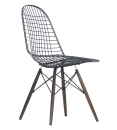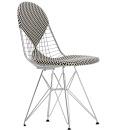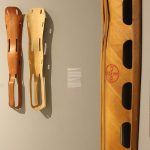Design
The Vitra Wire Chairs by Charles and Ray Eames were realised in 1951 and formally cite the shells of the Eames Plastic Chairs: albeit in welded steel wire. And despite the same shape, the Wire Chairs embody a completely different style: the mesh structure and glossy material give the Eames chairs an elegant, airy silhouette. The legendary Bikini-pad or a comfortable seat cushion harmoniously complements the Vitra chair. As with the Eames Plastic Chairs all Vitra Wire Chairs have the same shell, but bases differ. The DKR Wire Chair features the sculptural Eiffel Tower frame, the DKX a four-legged steel tube base and the Vitra DKW a wooden frame. With the DKR Wire Chair Outdoor Vitra also offers an outdoor, garden, variant.
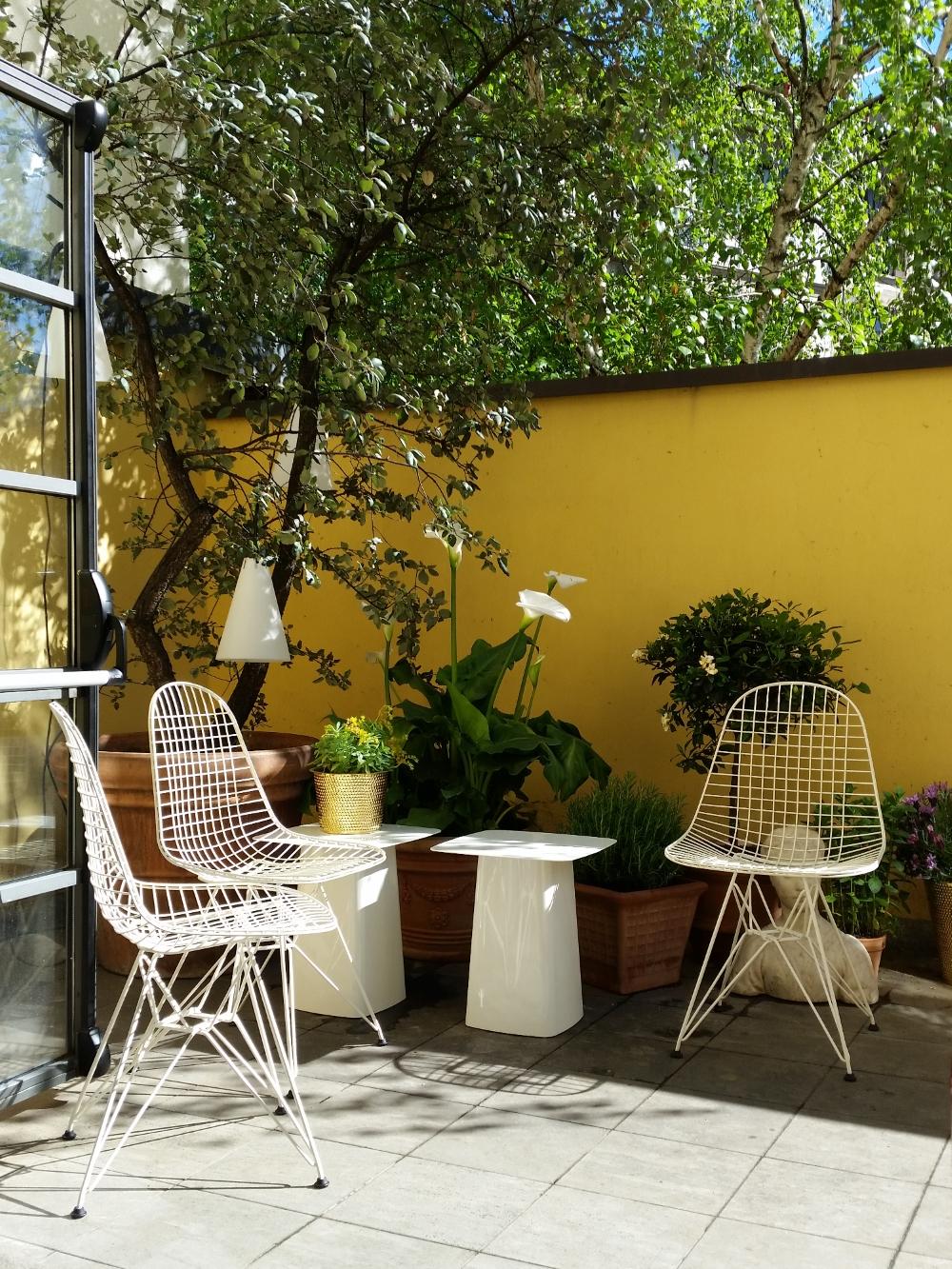
Eames Wire Chair Outdoor from Vitra
Manufacturer
Vitra is the only authorized manufacturer of Eames furniture in Europe and Asia. There has always been a close relationship between the Eames couple and the Swiss company, and even today, when it comes to important decisions, the question is still asked, "What would Charles and Ray do?". Vitra, however, doesn't focus solely on maintaining the legacy of the Eames' and their design classics, but also works successfully with contemporary designers such as Hella Jongerius or Erwan and Ronan Bouroullec on developing and furthering furniture design. In addition, the Vitra Campus, and in particular the Vitra Design Museum with its ever changing exhibitions, is committed to promoting design, art and architecture and making it accessible to more people.

The Vitra Campus is open to visitors
Designer
Charles Eames, born in 1907 in Saint Louis, Missouri, and Ray Eames, born 1912 in Sacramento, California, met at the Cranbrook Academy of Art in 1940, where they studied architecture and painting, respectively: a year later got married and founded the Eames Office. Their talent was combined in the Wire Chairs: while Charles gave the collection a technical-rational input with a new production process, Ray took over the artistic-aesthetic part with the playful design of the seat shell and the textiles. Both disciplines flowed into the design in a balanced way, which was characteristic of the Eames' philosophy. The couple's revolutionary design classics, which can be used throughout the home and sometimes even outdoors, helped Herman Miller become a world leader in office and home furniture. With their legendary furniture, videos, photographs, textiles and the Eames House, Charles and Ray Eames contributed to the history of furniture design like no other designers and became the most influential designer couple of the 20th century. Charles Eames passed away on August 21, 1978, Ray Eames exactly ten years later, on August 21, 1988.
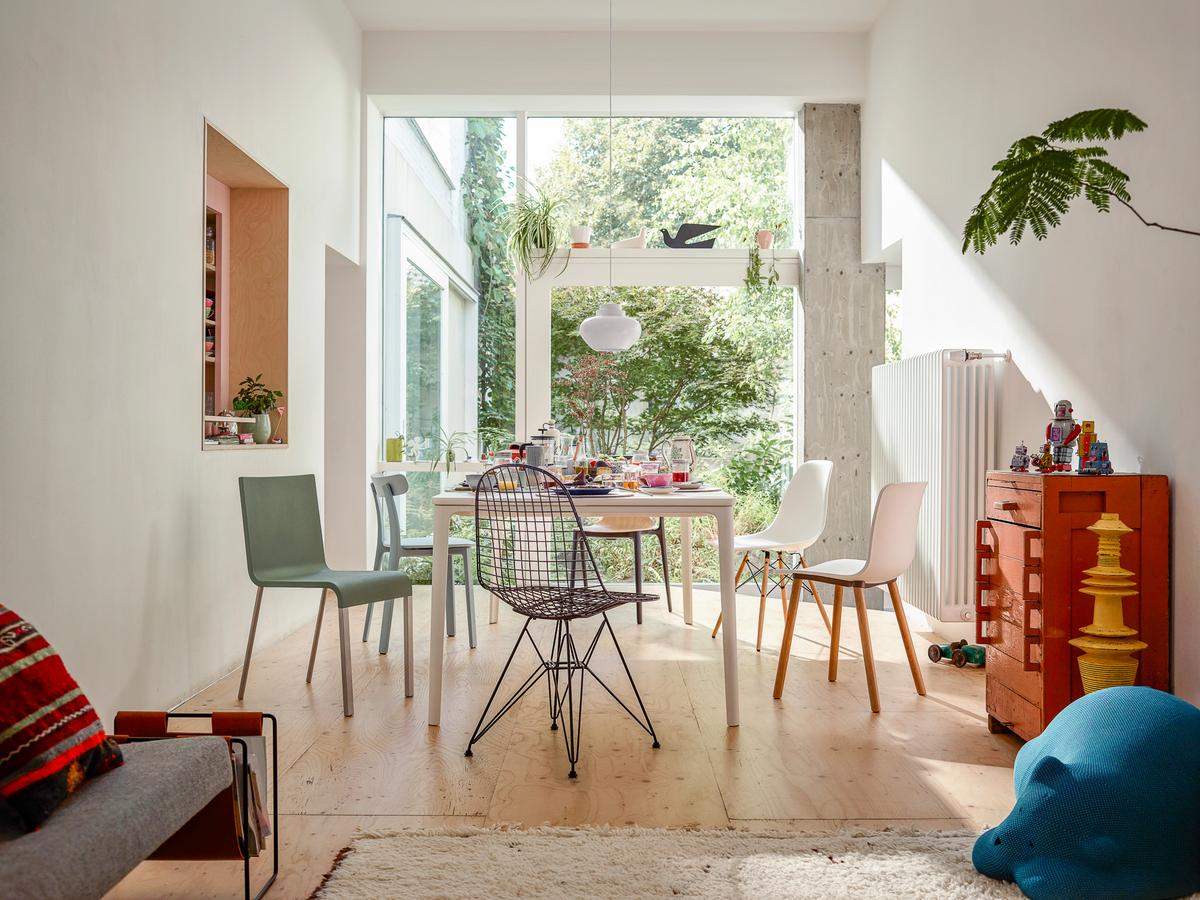
Eames Wire Chair and other Vitra chairs in the dining room
Production
The Eames Wire Chairs were introduced in 1951 by the American furniture manufacturer Hermann Miller. Although the shape of the seat shell is similar to the Eames Plastic Chairs, a completely different technology is used for the metal collection. Instead of plastic, the shell is made of steel wire, which is welded together to form a sturdy net with a perforated pattern. This transparency gives the chair a sculptural, organic and light-looking form. By using electrical resistance welding, the Vitra chair was a technological revolution for the time. With this method of metal processing, which was previously used in the automotive and aerospace industries, Hermann Miller was the first to receive a patent for industrially manufactured chairs. The speed of robot design, the quality and the low cost made the launch of the Eames Wire Chairs collection an instant international success. Since 1958, the European manufacturer Vitra has been producing the Wire Chair using the same procedure. The metal rods are overlaid and held under pressure between two electrodes before current flows through them. After a very short cooling of the melting point, the rods can be loosened and then welded together. In 2016, Vitra extended the original height of the Eames Wire Chairs by 20 mm. This change is visually little recognizable, since the design remained unchanged. However, the adaptation allowed for a more comfortable seat height, as people's body height has changed over the decades and the chairs can now also be better combined with different dining tables. Thanks to the epoxy coating of the metal structure, some Vitra Wire Chairs can also be used outdoors.
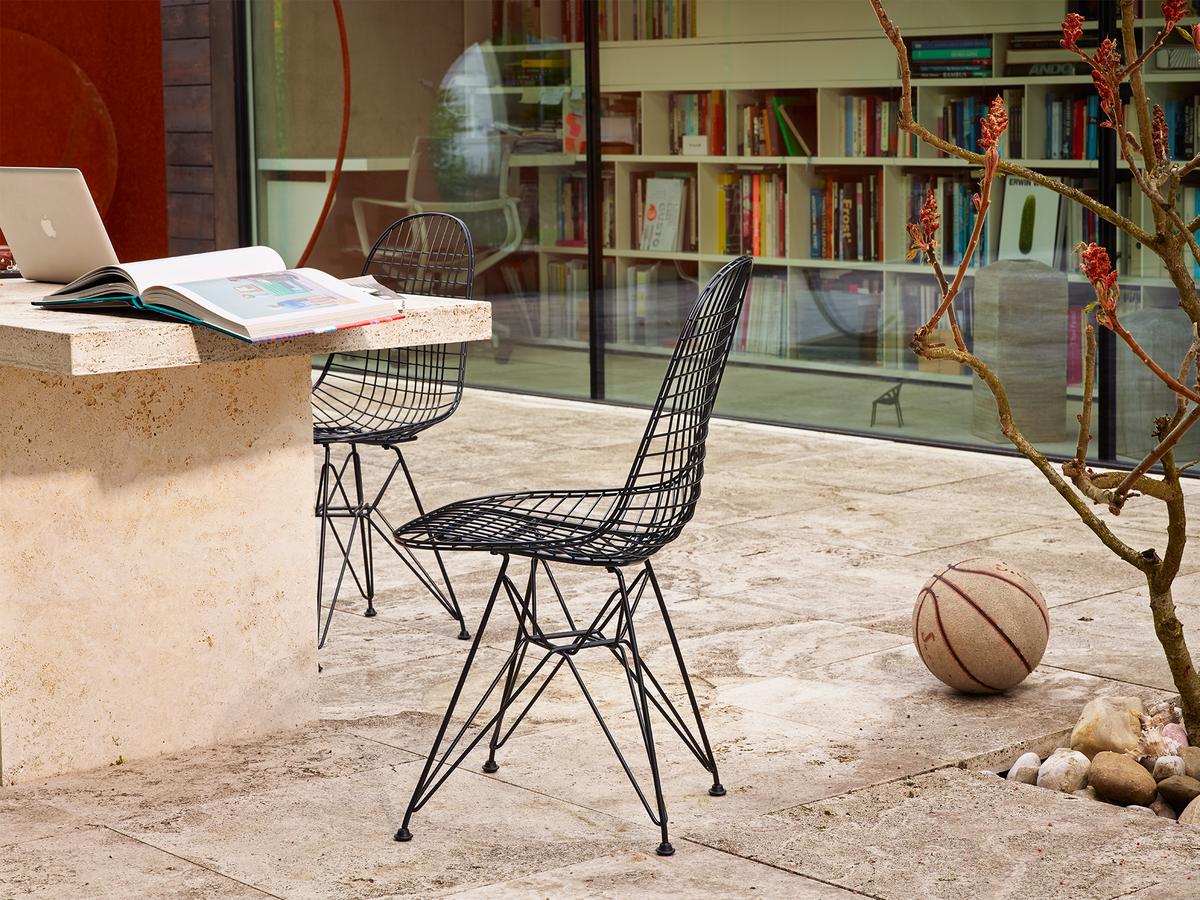
Eames Wire Chairs DKR with powder coating for outdoor use
Historical Context
In the post-war period so-called Mid-Century Design emerged in America, and which saw the development of new forms thanks to new materials and manufacturing processes. With their innovative designs, Charles and Ray Eames were leaders in this field. The growing demand for housing and rising rents have become a challenge, the living space ever smaller; consequently, it was necessary to develop flexible and multifunctional furniture such as the Eames chairs, which offer many possible combinations. In the years following their introduction, the Eames Chairs were regularly used in libraries, schools or other public places. Ray and Charles Eames influenced generations of furniture designers, for example, British designer Karim Rashid praised the couple's ability to engage in many creative areas. Ross Lovegrove, who also worked for Herman Miller, emphasized the influence of the Eames' on his research into innovative materials. For the brothers Bouroullec Charles and Ray Eames are an important pillar of contemporary design.
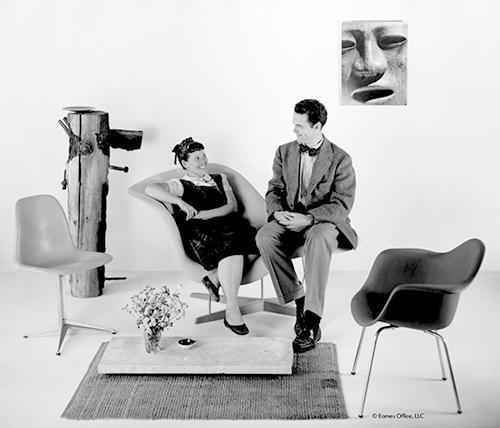
Ray & Charles Eames

